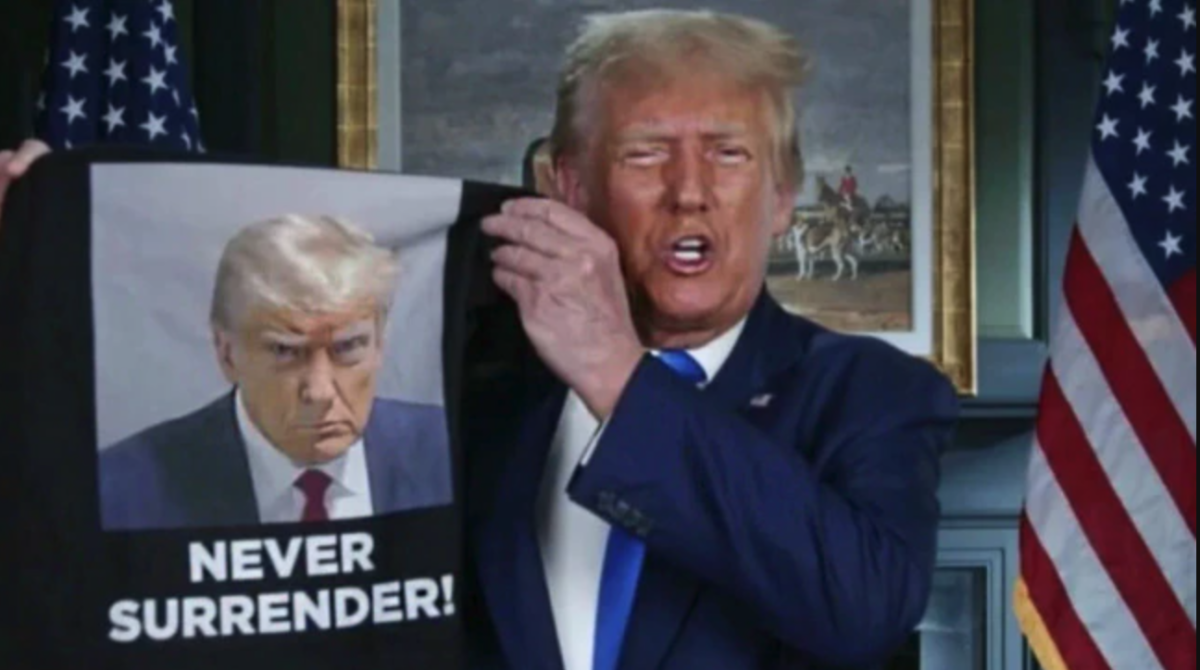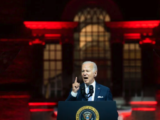
Trump will never surrender. He must be charged, tried, convicted, jailed and defeated again at the ballot box: NAJ screen shot
The Big Picture –
By Glynn Wilson –
WASHINGTON, D.C. — As if we needed any more evidence to backup our unique name for the so-called “Freedom Caucus,” a new book and review show that a far right movement of MAGA Republicans in the House should be called the “Dixie Caucus,” because the brain trust behind it is using racist language as propaganda to fool uneducated, poor people into voting their way.
In a forthcoming book, Tired of Winning: Donald Trump and the End of the Grand Old Party, Jonathan Karl, a chief Washington correspondent for ABC News and a stringent conservative, has emerged as a critic of Donald Trump and Steve Bannon, who is back in Trump’s inner circle planning for Trump’s election campaign and what he will do if he wins.
As a member of Trump’s brain trust who ran his campaign for president in the final months of the 2016 campaign, of late Steve Bannon has used Confederate code words linked to the assassination of Abraham Lincoln to describe what they are planning in the campaign and if Trump wins.
Describing a speech by the former president before his first criminal indictment, this new book says Trump and Bannon used the phrase ‘Come Retribution’.
Addressing the Conservative Political Action Conference in Maryland back on March 6, Trump took aim at Alvin Bragg, the Manhattan district attorney then widely expected to bring charges over hush-money payments to the porn star Stormy Daniels, thereby making Trump the first former president to ever face a criminal indictment.
“I am your warrior; I am your justice,” Trump told his audience. “And for those who have been wronged and betrayed, I am your retribution.â€
“When I spoke with Bannon a few days later, he wouldn’t stop touting Trump’s performance,” Karl says, referring to it as his ‘Come Retribution’ speech.
“What I didn’t realize was that ‘Come Retribution’, according to some civil war historians, served as the code words for the Confederate Secret Service’s plot to take hostage – and eventually assassinate – President Abraham Lincoln,†Karl says, according to a review of the book just published in The Guardian.
Bannon used Confederate code words to describe Trump speech, book says
Of course Lincoln was shot at Ford’s Theatre in Washington on April 14, 1865, by John Wilkes Booth, an actor. The president died the following day.
Karl is the author of two bestsellers – Front Row at the Trump Show and Betrayal – about Trump’s rise to the presidency, his time in the White House and defeat by Joe Biden.
In his third Trump book, excerpted in the Atlantic on Thursday, Karl quotes from a 1988 book, Come Retribution: The Confederate Secret Service and Assassination of Lincoln.
“The use of the key phrase ‘Come Retribution’ suggests that the Confederate government had made a bitter decision to repay some of the misery that had been inflicted on the South,†the authors write. “Bitterness may well have been directed toward persons held to be particularly responsible for that misery, and Abraham Lincoln certainly headed the list.â€
Bannon, Karl writes, “actually recommended that I read that book, erasing any doubt that he was intentionally using the Confederate code words to describe Trump’s speech.”
“Trump’s speech was not an overt call for the assassination of his political opponents, but it did advocate their destruction by other means.” Karl writes, citing a Trump speech in which he says success ‘is within our reach, but only if we have the courage to complete the job, gut the deep state, reclaim our democracy, and banish the tyrants and Marxists into political exile forever. This is the turning point.â€
In Karl’s estimation, the “Come Retribution†speech “was a turning point for Trump’s campaign†for re-election.
Trump began his 2024 campaign sluggishly but then surged to huge leads over his Republican party rivals in national and key-state polling, despite a charge sheet now totaling 91 criminal counts and two civil trials, one over his business practices and one concerning a defamation claim arising from a rape allegation a judge called “substantially trueâ€.
The federal trial date for the charge of interfering in the 2020 election has been set for March 4, while the hush-money case in New York is set for March 25 and the classified-documents case is set for May 20 in Florida.
“As election day approaches and [Trump] faces down these many days in court, he will be waging a campaign of vengeance and martyrdom. He will continue to talk about what is at stake in the election in apocalyptic terms – ‘the final battle’ – knowing how high the stakes are for him personally. He can win and retake the White House. Or he can lose and go to prison.â€
“Trump’s on offense and talking about real things,” Bannon is quoted as saying. “The ‘Come Retribution’ speech had 10 or 12 major policies.â€
“Bannon knew that the speech wasn’t about policies in a traditional sense,” Karl writes. “Trump spoke about whom he would target once he returned to power.”
“‘We will demolish the deep state. We will expel the warmongers,’ Trump said. ‘We will drive out the globalists; we will cast out the communists. We will throw off the political class that hates our country … We will beat the Democrats. We will rout the fake news media. We will expose and appropriately deal with the RINOs. We will evict Joe Biden from the White House. And we will liberate America from these villains and scoundrels once and for all.’â€
Well, maybe. Or maybe not.
The New York Times carries a public opinion story on Sunday saying Biden is trailing Trump in six key battleground states, while admitting it’s too early to predict the ultimate outcome since so many things can change between now and next November.
Why Biden Is Behind, and How He Could Come Back
You may recall a story we published last month which ended with a video of retired Washington Post editor Marty Baron.
We Can Overcome Ignorance and Fascism — By Reading
Since we figure most viewers didn’t take the time to watch the LA Times Book Club event, we re-run it here today. During the event, Baron recommended to those leading The Washington Post now to focus on what Trump plans to do if he somehow manages to avoid jail time, wins the Republican nomination, and is elected president again.
Well today, the Post did just that.
Trump and allies plot revenge, Justice Department control in a second term
To summarize, Trump’s formal and informal advisers have also discussed deploying the military to quell potential unrest on Inauguration Day, while critics have called the ideas under consideration “dangerous and unconstitutional.”
Trump and his allies have begun mapping out specific plans for using the federal government to punish critics and opponents should he win a second term, the Post reports, with the former president naming individuals he wants to investigate or prosecute and his associates drafting plans to potentially invoke the Insurrection Act on his first day in office to allow him to deploy the military against civil demonstrations.
In public, Trump has vowed to appoint a special prosecutor to “go after†President Biden and his family. The former president has frequently made corruption accusations against them that are not supported by available evidence.
In private, Trump has told advisers and friends in recent months that he wants the Justice Department to investigate onetime officials and allies who have become critical of his time in office, including his former chief of staff, John Kelly, and former attorney general William P. Barr, as well as his ex-attorney Ty Cobb and former Joint Chiefs of Staff chairman Gen. Mark A. Milley. Trump has also talked of prosecuting officials at the FBI and Justice Department.
To facilitate Trump’s ability to direct Justice Department actions, his associates have been drafting plans to dispense with 50 years of policy and practice intended to shield criminal prosecutions from political considerations.
“It would resemble a banana republic if people came into office and started going after their opponents willy-nilly,†said Saikrishna Prakash, a constitutional law professor at the University of Virginia who studies executive power. “It’s hardly something we should aspire to.â€
Much of the planning for a second term has been unofficially outsourced to a partnership of right-wing think tanks in Washington. Dubbed “Project 2025,†the group is developing a plan, to include draft executive orders, that would deploy the military domestically under the Insurrection Act. The law, last updated in 1871, authorizes the president to deploy the military for domestic law enforcement.
Of course it was designed to use the Union army against Confederate uprisings, which we should keep in mind today. This was not included in the Post story.
The proposal was identified in internal discussions as an immediate priority, the communications showed. In the final year of his presidency, some of Trump’s supporters urged him to invoke the Insurrection Act to put down unrest after the murder of George Floyd in the summer of 2020, but he never did it. Trump has publicly expressed regret about not deploying more federal force and said he would not hesitate to do so in the future.
Trump campaign spokesman Steven Cheung would not answer questions about specific actions under discussion.
“President Trump is focused on crushing his opponents in the primary election and then going on to beat Crooked Joe Biden,†Cheung said. “President Trump has always stood for law and order, and protecting the Constitution.â€
The truth is the opposite.
Trump clearly doesn’t care about the Constitution or the fate of the country. As someone who suffers from narcissistic personality disorder, he only cares about his own wealth and power, as numerous experts and those who know Trump have pointed out over the past few years. Look no further than his refusal to accept the outcome of the 2020 election and his incitement of an insurrection on Jan. 6, 2021. Then remember, he is the first president ever to refuse to attend the inauguration of his opponent.
“The discussions underway,” according to the Post, “reflect Trump’s determination to harness the power of the presidency to exact revenge on those who have challenged or criticized him if he returns to the White House.”
The former president has frequently threatened to take punitive steps against his perceived enemies, arguing that doing so would be justified by the current prosecutions against him. Trump has claimed without evidence that the criminal charges he is facing — a total of 91 across four state and federal indictments — were made up to damage him politically.
“This is third-world-country stuff, ‘arrest your opponent,’†Trump said at a campaign stop in New Hampshire in October. “And that means I can do that, too.â€
He was already trying to do that before. The plan is to intensify this effort to destroy democracy and turn the country into a strong man dictatorship with the help of the police and military, which he seemed to be counting on to side with him on Jan. 6, 2021. Many of those in the military and cops did side with him, but enough stood by their oath to the Constitution and fought off the insurrectionists at the Capitol.
Special counsel Jack Smith, Attorney General Merrick Garland and President Biden have all said that Smith’s prosecution decisions were made independently of the White House, in accordance with department rules on special counsels, but no one in Trump’s orbit believes it. Every social media platform is polluted with content that backs up the false claims.
As the front runner in the Republican primary race, Trump is now making “retribution†a central theme of his campaign, seeking to intertwine his own legal defense with a call for payback against perceived slights and offenses to right-wing Americans. He repeatedly tells his supporters that he is being persecuted on their behalf and holds out a 2024 victory as a shared redemption at their enemies’ expense.
It’s unclear what alleged crimes or evidence Trump would claim to justify investigating his named targets, the Post reports. There is no evidence, and Trump and the Post know it.
In today’s world of fake news claims all other news is fake news, how are people supposed to know what’s real, and what they should “believe?”
The Post got in touch with some of those who are specifically mentioned by Trump, including former White House Chief of Staff and General John Kelly.
Kelly said he would expect Trump to investigate him because since his term as chief of staff ended, he has publicly criticized Trump, including by alleging that he called dead service members “losers and suckers.â€
“There is no question in my mind he is going to go after people that have turned on him,†Kelly said.
William Barr, Trump’s pick for Attorney General after he fired Jeff Sessions of Alabama, has contradicted the former president’s false claims about the 2020 election and called him “a very petty individual who will always put his interests ahead of the country’s.†Asked about Trump’s interest in prosecuting him, Barr deadpanned, “I’m quivering in my boots.â€
“Trump himself is more likely to rot in jail than anyone on his alleged (hit) list,†said former Trump attorney Ty Cobb, who accused Trump of “stifling truth, making threats and bullying weaklings into doing his bidding.â€
Milley refused to comment.
Other modern presidents since the Watergate scandal — such as when Richard Nixon tried to suppress the FBI’s investigation into his campaign’s spying and sabotage against Democrats — have sought to separate politics from law enforcement, as the Post reports. Presidents of both parties have imposed a White House policy restricting communications with prosecutors.
An effort under the administration of George W. Bush to remove U.S. attorneys for political reasons led to high-level resignations and a criminal investigation, although down in Alabama, the Bush Justice Department managed to use the federal courts to send former Alabama Governor Don Siegelman to prison for seven years and ruin his life and political career.
Rod Rosenstein, the Trump-appointed deputy attorney general who oversaw the investigation by special counsel Robert Mueller into Russian interference in the 2016 election, said a politically ordered prosecution would violate the 14th Amendment’s guarantee of equal protection under law and could cause judges to dismiss the charges. But that constitutional defense has rarely been raised in U.S. history, Rosenstein said.
“Making prosecutorial decisions in a nonpartisan manner is essential to democracy,†Rosenstein said. “The White House should not be meddling in individual cases for political reasons.â€
But Trump allies such as Russ Vought, his former budget director who now leads the Center for Renewing America, are actively repudiating the modern tradition of a measure of independence for the Department of Justice, arguing that such independence is not based in law or the Constitution. Vought is in regular contact with Trump and would be expected to hold a major position in a second term.
“You don’t need a statutory change at all, you need a mind-set change,†Vought said in an interview. “You need an attorney general and a White House Counsel’s Office that don’t view themselves as trying to protect the department from the president.â€
As president, Kelly has said in the past, Trump would often suggest prosecuting his political enemies, or at least having the FBI investigate them. Kelly said he would not pass along the requests to the Justice Department but would alert the White House Counsel’s Office. Usually, they would ignore the orders, he said, and wait for Trump to move on. In a second term, Trump’s aides could respond to such requests differently, he said.
“The lesson the former president learned from his first term is don’t put guys like me … in those jobs,†Kelly said. “The lesson he learned was to find sycophants.â€
Although aides have worked on plans for some other agencies, Trump has taken a particular interest in the Justice Department. In conversations about a potential second term, Trump has made picking an attorney general his number one priority, according a Trump adviser.
“Given his recent trials and tribulations, one would think he’s going to pick up the plan for the Department of Justice before doing some light reading of a 500-page white paper on reforming the EPA,†said Matt Mowers, a former Trump White House adviser.
Jeffrey Clark, a fellow at Vought’s think tank, is leading the work on the Insurrection Act under Project 2025. The Post has reported that Clark is one of six unnamed co-conspirators whose actions are described in Trump’s indictment in the federal election interference case.
Clark was also charged in Fulton County, Georgia, with violating the state anti-racketeering law and attempting to create a false statement, as part of the district attorney’s case accusing Trump and co-conspirators of interfering in the 2020 election. Clark has pleaded not guilty. As a Justice Department official after the 2020 election, Clark pressured superiors to investigate nonexistent election crimes and to encourage state officials to submit phony certificates to the electoral college, according to the indictment.
In one conversation described in the federal indictment, a deputy White House counsel warned Clark that Trump’s refusing to leave office would lead to “riots in every major city.†Clark responded, according to the indictment, “That’s why there’s an Insurrection Act.â€
Clark had dinner with Trump during a visit to his Bedminster, N.J, golf club this summer. He also went to Mar-a-Lago on Wednesday for a screening of a new Dinesh D’Souza movie that uses falsehoods, misleading interviews and dramatizations to allege federal persecution of Jan. 6 rioters and Christians. Also attending were fringe allies such as Steve Bannon, Roger Stone, Laura Loomer and Michael Flynn.
“I think that the supposedly independent DOJ is an illusion,†Clark said in an interview. Through a spokeswoman he did not respond to follow-up questions about his work on the Insurrection Act.
Clark’s involvement with Project 2025 has alarmed some other conservative lawyers who view him as an unqualified choice to take a senior leadership role at the department, according to a conservative lawyer who spoke on the condition of anonymity to describe private talks.
Project 2025 director Paul Dans stood by Clark in a statement.
“We are grateful for Jeff Clark’s willingness to share his insights from having worked at high levels in government during trying times,†he said.
There is a heated debate in conservative legal circles about how to interact with Trump as the likely nominee, according to the Post. Many in Trump’s circle have disparaged what they view as institutionalist Republican lawyers, particularly those associated with the Federalist Society. Some Trump advisers consider these individuals too soft and accommodating to make the kind of changes within agencies that they want to see happen in a second Trump administration.
Trump has told advisers that he is looking for lawyers who are loyal to him to serve in a second term — complaining about his White House Counsel’s Office unwillingness to go along with some of his ideas in his first term or help him in his bid to overturn his 2020 election defeat.
In repeated comments to advisers and lawyers around him, Trump has said his biggest regrets were naming Jeff Sessions and Barr as his attorneys general and listening to others — he often cites the “Federalist Society†— who wanted him to name lawyers with impressive pedigrees and Ivy League credentials to senior Justice Department positions.
Trump has mentioned to several lawyers who have defended him on TV or attacked Biden that they would be a good candidate for attorney general, according to people familiar with his comments.
The overall vision that Trump, his campaign and outside allies are now discussing for a second term would differ from his first in terms of how quickly and forcefully officials would move to execute his orders. Alumni involved in the current planning generally fault a slow start, bureaucratic resistance and litigation for hindering the president’s agenda in his first term, and they are determined to avoid those hurdles, if given a second chance, by concentrating more power in the West Wing and selecting appointees who will carry out Trump’s demands.
Those groups are in discussions with Trump’s campaign advisers and occasionally the candidate himself, sometimes circulating policy papers or draft executive orders, according to people familiar with the situation.
“No one is opposed to them putting together ideas, but it’s not us,†a campaign adviser said. “These groups say they’ll have the whole transition planned. Some of those people I’m sure are good and Trump will appoint, but it’s not what is on his mind right now. I’m sure he’d be fine with some of their orders.â€
Trump’s core group of West Wing advisers for a second term is widely expected to include Stephen Miller, the architect of Trump’s hard-line immigration policies including family separation, who has gone on to challenge Biden administration policies in court through a conservative organization called America First Legal. Miller did not respond to requests for comment.
Alumni have also saved lists of previous appointees who would not be welcome in a second Trump administration, as well as career officers they viewed as uncooperative and would seek to fire based on an executive order to weaken civil service protections.
For other appointments, Trump would be able to draw on lineups of personnel prepared by Project 2025. Dans, a former Office of Personnel Management chief of staff, likened the database to a “conservative LinkedIn,†allowing applicants to present their resumes on public profiles, while also providing a shared workspace for Heritage and partner organizations to vet the candidates and make recommendations.
“We don’t want careerists, we don’t want people here who are opportunists,†he said. “We want conservative warriors.â€
How to Respond
This is probably not what most people in the country want. But unless they are told the story, how can they evaluate the rhetoric of Trump and his sycophants like Bannon and now Speaker of the House Mike Johnson?
It will be up to Democrats to share this information on social media with their seemingly brain washed friends and family members. Otherwise, the conservative media empires on cable television, the web and social media are not going to tell the true story, and the 2024 election is going to be a close, massive fight to the finish on Tuesday, Nov. 5, 2024.
___
If you support truth in reporting with no paywall, and fearless writing with no popup ads or sponsored content, consider making a contribution today with GoFundMe or Patreon or PayPal. We just tell it like it is, no sensational clickbait or pretentious BS.













